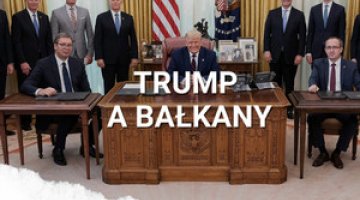Serbia – Kosovo: an agreement without future?
On 2 September Serbia and Kosovo signed an agreement relating to trade relations under which the Serbian party committed to recognising Kosovar customs documents and both countries agreed to lift their respective imports embargoes. Serbia, which does not recognise Kosovo’s independence, had been blocking the import of goods from Kosovo from 2008. In return, in July 2011, Kosovo's authorities imposed an embargo on goods from Serbia and, in order to enforce it, they tried to place officials of Albanian nationality at border crossings in the north of the country (Jarinje, Brnjak). This move was also intended to help Pristina take over control of the communes bordering Serbia which do not recognise the independence of Kosovo or its government. However, following violent protests from local Serbs, UN KFOR soldiers took over control of the border crossings. The European Union also stepped up pressure on Belgrade and Pristina for them to stop the customs war.
Comment
- The agreement formally ends the customs war between Serbia and Kosovo. Numerous contentious issues regarding its provisions make it difficult to assess whether this agreement will lead to a final normalisation of trade relations between the two countries. The key areas that raise controversies concern the staffing of border crossings and the division of revenues from customs fees between the government in Pristina and the Serbian local government in the north of Kosovo.
- Contrary to the EU's intentions, the compromise which was reached has caused an escalation of tensions at the Kosovar-Serbian border. In the opinion of Kosovo's Serbs the newly-signed agreement is a prelude to Pristina taking control over the border with Serbia and, consequently, also over northern Kosovo which has so far enjoyed autonomy.
- The ultimatum put forward in August 2011 by Chancellor Angela Merkel also contributed to an increased feeling of disquiet in the Serbian community in Kosovo. Merkel made the granting of EU candidate status to Serbia conditional on scrapping the institutions financially supported by Belgrade (the education system, the healthcare system, administration, the police) and introducing the EU EULEX mission to the northern part of Kosovo. Local Serbs feel that these efforts will result in depriving them of sources of revenues and force them to immigrate to Serbia.
- The growing discontent of the Serbs living in the northern part of Kosovo places Serbia in quite a delicate situation. So far Belgrade, under pressure from the EU, has agreed to concessions with regard to Pristina as last autumn it sought the status of EU candidate country. However, this has been negatively received in Serbian society, which has shown solidarity with their compatriots beyond the Kosovar border. The pro-EU Serbian government must take these feelings into account in the run-up to the approaching parliamentary elections, scheduled for the spring of 2012. It cannot ruled out that the Serbian government will temporarily abandon its efforts to obtain the status of EU candidate country, which would deprive the EU of an instrument of exerting direct pressure on Belgrade and which could result in suspending the Kosovar-Serbian dialogue.





